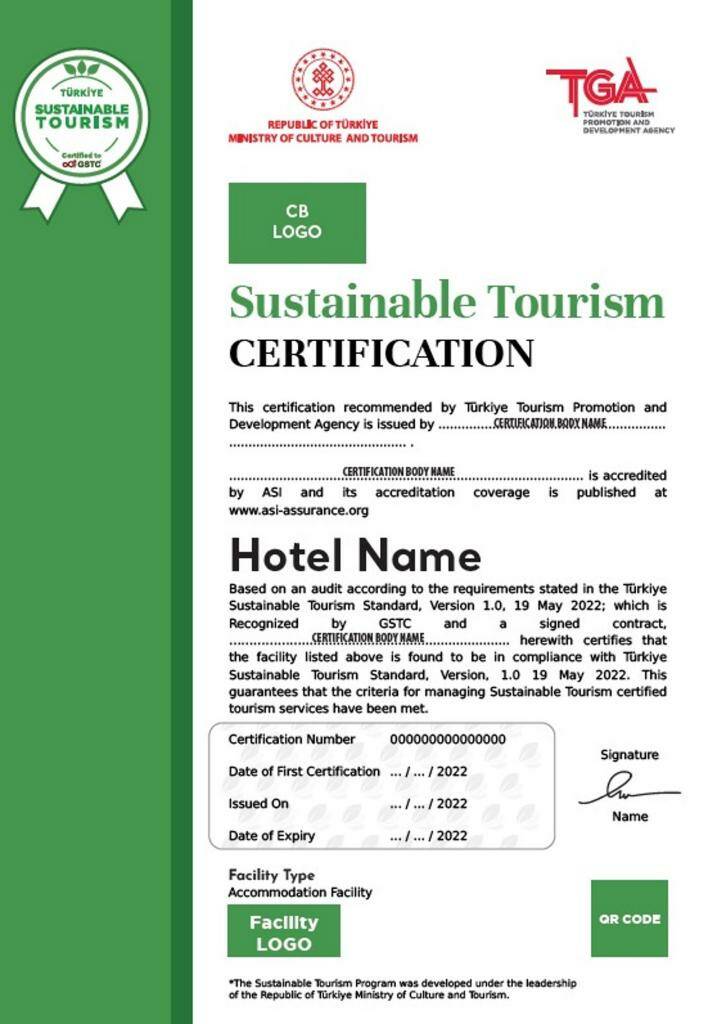Türkiye already had lush pine and cedar forests, fine sandy beaches, crystal-clear turquoise seas, and an impressive cultural and historical heritage. Still, with the addition of its National Sustainable Tourism Programme, it has become one of the world’s most essential destinations for a sustainable holiday. Featuring ecological and cultural riches, Türkiye is distinctive in offering accommodation options that strictly adhere to sustainability principles and numerous eco-tourism opportunities. As of September 30th, Türkiye is home to 6,156 verified/certified facilities within the scope of sustainability, mainly in the Antalya, İstanbul and Muğla provinces. As the number of sustainability-certified facilities is rapidly rising, the overall effort in Turkish tourism to reduce carbon footprint by utilising environmentally designed structures and sustainable practices is also increasing. This country-wide initiative supports local cultures and economies while providing guests a meaningful and memorable stay.
Türkiye was the ‘First Country in the World to sign a Protocol with GSTC.
To achieve a sustainable transformation in the tourism sector, Türkiye signed a cooperation agreement to develop a national program last year with the Global Sustainable Tourism Council (GSTC), which establishes and manages global standards for travel and tourism. Furthermore, Türkiye is the ‘first country in the world’ to sign this agreement on a government level. In line with its three-year plan to restructure its tourism industry, Türkiye also developed a National Sustainable Tourism Programme. Through the Programme, Türkiye will incorporate sustainability principles into all tourism policies, encompassing destinations, tour operators, and accommodation facilities. The primary goal of the Sustainable Tourism Program is to ensure that accommodation facilities obtain the Sustainable Tourism Certificate, which consists of 42 globally accepted criteria. During this process, accommodation facilities are subject to an independent evaluation for certification, which is repeated annually. Through effective sustainability planning, verification/certification also enables facilities to improve their sustainability efforts continuously. With this increased awareness, the number of sustainability-verified/certified facilities in Türkiye is proliferating. According to Türkiye’s National Sustainable Tourism Programme, all facilities must have a “Sustainable Tourism Certificate” by 2030.
Responsible Hospitality
Türkiye’s National Sustainable Tourism Programme aims to maximise social and economic benefits for local people while protecting cultural heritages and conserving biodiversity, ecosystems and natural beauties. In addition, the Programme aims to reduce pollution and save resources, ensuring that tourism is environmentally friendly in every aspect. Accommodation facilities that earn a sustainability certificate through the Programme provide guests with a world-class sustainable accommodation experience while also helping to protect the environment. Facilities that enhance the visitor experience via environmentally friendly practices also benefit the local community; implementing and carrying out such procedures in a fair, responsible, inclusive and sensitive manner supports and contributes to preserving the unique values and culture of local populations and communities.
In Türkiye, the evaluation of accommodation facilities is conducted under four main categories: “Sustainable Management”, “Cultural Impacts”, “Socio-economic Impacts”, and “Environmental Impacts”. The facility’s first step towards obtaining a sustainability certificate is demonstrating effective sustainable management. Numerous subsequent steps are required for verification/certification, including developing sustainability policies and action plans, creating accurate promotions, and communicating performance to stakeholders through regular reporting. In addition, facilities are required to organise sustainability-related training. At the same time, accommodation facilities are assessed regarding their cultural and socioeconomic impacts. Accommodation facilities are expected to protect cultural heritages, allow guests to interact with local culture, support the regional economy and contribute to prosperity through practices such as encouraging local employment, promoting local purchasing, and supporting local entrepreneurs. These measures are intended to maximise facilities’ environmental benefits while minimising adverse effects. Each facility is expected to meet several requirements, such as prioritising local and fair-trade suppliers, minimising water and energy consumption, managing solid waste, implementing recycling practices, and implementing biodiversity and landscape protection measures.

